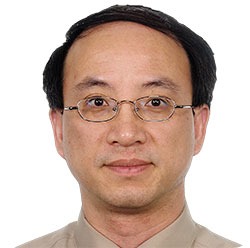Prostate cancer development is associated with both inherited and acquired genetic alterations. More than 70 inherited genetic variants have been consistently identified in human DNA that may contribute to susceptibility or risk of prostate cancer.
While none of these inherited variants have been consistently proved to be associated with cancer progression, which is the main cause of prostate cancer death, loss and gain of many pieces of DNA containing important genes in prostate cells were known to be implicated in the pathogenesis of prostate cancer and have previously been linked to higher tumour stage or grade or adverse clinical outcome.
Your recent research looked at changes in gene regions and the development of prostate cancer. How did you detect the genetic changes in cells from prostate tumors?
We used a tool which is called SNP microarray containing more than 1.8 millions of markers across all of the regions in human DNA to detect the integrity or DNA copy number changes in the cells from both tumour and normal tissues from the same patient.
By comparing the copy number of these 1.8 millions of markers in the tumour cells to those in the normal cells, we were able to detect all of the genetic changes of these regions in a particular patient.
How many gene regions did you find to contribute to prostate cancer development?
We have identified 20 gene regions that contribute to prostate cancer development.
Why do you think four of these regions not been previously reported?
I think a combination of using a high resolution of SNP array with more than 1.8 million of markers, a computer software program called “Genomic Identification of Significant Targets in Cancer” and a population of patents with various types of prostate cancer has contributed to our success in identification of these regions.Your research found that seven of the twenty regions were linked with early death from prostate cancer. Did your research indicate the mechanism behind this link?
No, our study was not designed to identify the mechanism behind these links. However, several of these genes, such as of PTEN, TP53 and MYC have been demonstrated to play a role of tumour suppressor or oncogene.
What impact do you think this new knowledge about the genetic changes involved in the development and progression of prostate cancer will have?
Our findings from this retrospective study may allow for more accurate prognosis of patients with high-risk, at the time of surgery or biopsy, and may help guide the selection of appropriate therapy once validated in prospective studies.
In addition, the information generated by our study may impact clinical management or the stratification of patients in clinical trials.
Do you think this research will help prostate cancer treatment become more personalized in the future?
Yes, I do. For examples, if PTEN deletion is detected in the tumour of their patients, physicians may consider to add PI3K pathway inhibitors as a part of their expected treatment strategy.
How much is the development of prostate cancer influenced by environmental factors?
Our current research did not include the analysis of environmental factors on development of prostate cancer.
Previous epidemiological studies from other groups have shown a link between environmental factors, such as diet and stress, and prostate cancer risk.
What further research needs to be carried out into changes in DNA regions and the development of prostate cancer?
In addition to deletions and amplifications, DNA in prostate tumour cells also contain other types of genetic changes, such as mutation, translocation, inversion, methylation and other types of epigenetic modifications.
Integrating all of these genetic and epigenetic alterations with clinical outcomes is very important in understanding how the disease progresses, and thereby treating various types of prostate cancer.
Where can readers find more information?
The results of our original study entitled “Genetic markers associated with early cancer-specific mortality following prostatectomy” have been published in Cancer, which can be accessed at:
http://onlinelibrary.wiley.com/doi/10.1002/cncr.27954/abstract;jsessionid=D43746FCF53664A319C99F9B3E81405C.d02t02.
About Dr. Jianfeng Xu
 Dr. Jianfeng Xu is a Professor of Genomics and Personalized Medicine Research, Cancer Biology and Urology at Wake Forest School of Medicine (WFSM). He serves as the Director of the Center for Cancer Genomics.
Dr. Jianfeng Xu is a Professor of Genomics and Personalized Medicine Research, Cancer Biology and Urology at Wake Forest School of Medicine (WFSM). He serves as the Director of the Center for Cancer Genomics.
Dr. Jianfeng Xu is trained in Medicine (Shanghai Medical University), Epidemiology, Human Genetics, and Genetic Epidemiology (Johns Hopkins University School of Public Health). Dr. Xu is a genetic epidemiologist and has extensive experience in genetic studies of prostate cancer.
Recently, he and his group focused on research in applying genetic findings in clinics and populations. Dr. Jianfeng Xu leads a group in designing, genotyping, and analyzing many genetic studies of cancer and has published more than 200 peer reviewed papers in this area.
His primary research interests are 1) discovery of associations for cancer risk and progression with inherited genetic variations as well as somatic genetic and epigenetic changes in tumors, and 2) application of genetic research findings for risk prediction, and genomic-targeted prevention, diagnosis, and treatment of cancer.